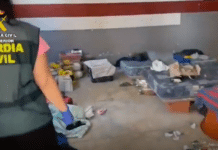A Swede, an Irishman, two Britons, a man from Granada and two from Murcia. It sounds like the beginning of a bad joke, but it isn’t.
Originating in North Africa, this international cannabis trafficking gang is alleged to have transported consignments of the drug by road to countries across Europe and the United Kingdom
Intelligence gathering by the Civil Guard in Madrid, received from informants, and clues that were the results of the surveillance showed that it was always fed through Spain to its final destination with storage generally taking place in an industrial warehouse in the San Ginés Industrial Estate in Alcantarilla.
The information was forwarded to the Organised Crime and Anti-Drug Team (Edoa) in Murcia, which found that the organisation allegedly used a ‘front company’ for fish distribution to cover up its illegal activities, managing to move significant quantities of cannabis and hashish via different routes from the south and east of the country.
The industrial warehouse was rented by the Murcian LOV, aged 45, and the Swede DR, aged 48, and dedicated to the import of fruit, although, in reality and according to the court proceedings, the facility was used as a logistics centre for the storage and distribution of the drugs.
In October 2017, the Civil Guard deployed a surveillance operation around the warehouse where agents observed the entry of several vehicles, including a van and a truck into which two pallets of boxes, thought to contain drugs, were loaded into a truck.
The vehicle travelled about 50 kilometres and was intercepted by officers from the Guardia Civil’s Traffic Department at kilometre 633 of the A-7, in Lorca. Inside the vehicle, the officers found twenty boxes with 150 vacuum-packed, pressed plastic bags filled with marijuana buds weighing 190 kilos and worth more than 200,000 euros. The 59-year-old truck driver from Granada, VRM, was arrested.
During the arrest, his mobile phone kept ringing. The caller was a mobile number that appeared with the name ‘Follaor’. The agents never found this person, but the operation led to the arrest of the rest of those involved, of British, Irish and Spanish nationality, who performed different functions within the network.
One of them was the 55-year-old Spaniard PJR, who drove an Audi A4 which acted as a shuttle vehicle, securing the route and notifying any possible police presence. But, as Edoa suspected, the network was not limited to Spain.
During the investigation, it was discovered that the Irish PD, another of the accused, aged 75, had contacts in the United Kingdom to coordinate the transfer of large quantities of narcotics. Another of these links was SM, resident in the United Kingdom, with whom PD met on several occasions to close agreements on the purchase and sale of drugs in Alicante.
The information gathered during the operation led to the arrest of another Briton, JW, aged 75, who had been in contact with PD in the Orihuela Costa area to transport hashish from Granada.
JW was intercepted, along with the Spaniard AFC, at a police checkpoint on the A-7 motorway near Totana, where more than 3 kilos of hashish were found hidden in the hidden compartments of his vehicle. The drugs were destined for the United Kingdom.
With the seven members of the network arrested, the Civil Guard searched the homes of the accused. In the house of LOV from Murcia – the person who rented the warehouse to store the 200 kilos of marijuana – the agents found a small plantation with 63 marijuana plants and material used for indoor cultivation.
At the home of PJR –the person in charge of the surveillance–, a money-counting machine was seized, along with 9,500 euros in cash, cash that investigators presume came from drug sales. In another search carried out at the home of the English PD in Orihuela Costa, three notebooks were found with notes on quantities of drugs and contacts related to drug trafficking activity.
The evidence gathered by the Civil Guard revealed the level of sophistication and organisation of the dismantled network. In addition to the vehicles used for transport, the network had its own surveillance systems and developed complex transport routes to avoid police controls.
The dismantling of this organisation was a major blow to drug trafficking in the region and to international drug transport routes. The operation highlighted the capacity of the security forces to infiltrate the framework of criminal networks and cut off the flow of drugs from their point of origin.
Meanwhile, the seven defendants faced legal proceedings last week with requests from the Public Prosecutor’s Office for sentences ranging from 3 and a half to 4 and a half years in prison and fines totalling two million euros.
Criminal lawyer Jorge Novella, who defended one of the main defendants, Murcia native LOV, said that before the trial there was an agreement with the prosecutor under which there would be a reduction in sentences if the defendants admitted the facts. Thus, his client agreed to a one-year prison sentence, which was suspended.
The same sentence was passed on the other Spaniard, AFC. The rest of the defendants were sentenced to two years, although they too will not go to jail. The agreement was determined by the mitigating factor of undue delays in a case that has already been going on for seven years.





